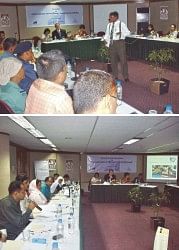Law event
Working together to counter human trafficking
 A consequence of the greater awareness of human trafficking at all level of the social order now seems to further make the victims suffer by additional ruthless activities of the accused. Previously when such alertness was not there towards this heinous organised crime, the victims of trafficking were mostly paid off for their sufferings and the matter would be settled outside the court. However, now that more people know about it and more are taking the aid of the law, more victims are under risk of losing lives. More are found missing or grievously injured and even brutally murder by the accused. This gives rise to the requirement of better facilities of safe custody and shelters for the victims.
A consequence of the greater awareness of human trafficking at all level of the social order now seems to further make the victims suffer by additional ruthless activities of the accused. Previously when such alertness was not there towards this heinous organised crime, the victims of trafficking were mostly paid off for their sufferings and the matter would be settled outside the court. However, now that more people know about it and more are taking the aid of the law, more victims are under risk of losing lives. More are found missing or grievously injured and even brutally murder by the accused. This gives rise to the requirement of better facilities of safe custody and shelters for the victims.
This had been one of the centre of discussion at the daylong event namely “Convention of Police officials and Public Prosecutors: Counter human trafficking” and “Research Dissemination session on Socio Legal aspects of TIP cases: Trends and the Way forward”, which was held at the BRAC Inn, Mohakhali, Dhaka on the June 14, 2008. The Daywalka Foundation (TDF) in collaboration with International Organization of Migration (IOM) organised the event. The Chief Guests of the program included the Mr. A. K. M. Mahfuzul Haque, Additional Inspector General of Police, Mr. Miah Md. Ali Akbar Azizee, Deputy Solicitor of the Ministry of Law, Justice and Parliamentary Affairs and Ms. Rabab Fatima, Regional Representative of South Asia, IOM.
Another point of discussion was that the police are now applying a more victim-friendly approach in carrying out their duties. Earlier most victims were treated as the accused when being found by the police. However, such trainings seem to have resulted in a wider understanding of the aspects and consequences of trafficking and a more pro-victim approach by the police officials.
The uniqueness of TDF training is that they are making a platform for mutual cooperation by bring the Police and the Public Prosecutors (PPs) together. They are also providing practical knowledge of trial preparation and making one realise the significance of the individual's role, from a victim centred approach. TDF developed a training plan and manual for the Police and PPs. In two years TDF has managed at create awareness and provide further knowledge regarding trafficking to 71 lawyers, 47 PPs, 171 members of the police and 30 judges.
The convention was created a natural space for the law enforcers and prosecutors to evaluate their role from critical perspectives and find out the challenges of our present laws. The session ended with a list of recommendations and learning objectives. These included more capacity building programs for the law enforcers and prosecutors, this time including judicial officials as participants of the programs. Provide specialised techniques on interrogations, preserving evidences like, fingerprints, more concentration on behavioural change of the duty bearer, etc.
In the afternoon session, TDF disseminated the findings of the research, "Socio Legal Aspects of TIP Cases". Jesmul Hasan, research consultant to TDF presented the findings where it was found that from 2000 through 2006 an increasing number of TIP cases were tried, while a decline in case took place in 2007. Perhaps the political environment is one of reasons for such a decline. All the prosecutors were withdrawn/reappointed during the period, which may also a cause of delay in disposal of TIP cases. Also it was found that due to lack of adequate number of judges and uneven distribution of cases, tribunals are overburdened and that is one of the major reasons of delay of disposal of the TIP cases. Law in different means victimises trafficking survivors/victims, due to lack of awareness regarding the issue. The study reveals a strong socio-legal interlinked dilemma. It shows how poverty, social stigma like social factors influences the legal factors, i.e., the justice system and creates delay in disposals. Referring from cases, it was stated that lower courts are more victims-friendly than the higher court and absconding is established as a presumption of guilt.
The session also compared the situation of human trafficking cases in our neighbouring countries. Citing Trafficking In Persons Report-2008, by State Department, it was stated that, Bangladesh does comparatively better than other countries in South Asia. The research team ended up with some recommendations like, formulating effective strategy to try TIP cases, special investigating agencies, law reforms to incorporate the rights of the victim/witness, etc. The session was concluded with comments from experts from various fields of work, including, Scott Parsons, TDF's Executive Director, Rosy Hossain, Regional Director South Asia, TDF, Nishat Chowdhry, Dr. Mizanur Rahman and Adilur Rahman Khan.
--Law Desk.